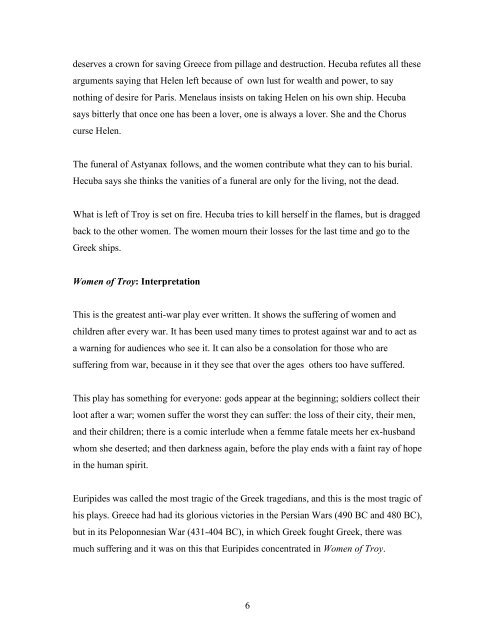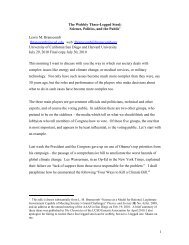1 EURIPIDES' TROJAN WOMEN PREFACE, TRANSLATION, and ...
1 EURIPIDES' TROJAN WOMEN PREFACE, TRANSLATION, and ...
1 EURIPIDES' TROJAN WOMEN PREFACE, TRANSLATION, and ...
Create successful ePaper yourself
Turn your PDF publications into a flip-book with our unique Google optimized e-Paper software.
deserves a crown for saving Greece from pillage <strong>and</strong> destruction. Hecuba refutes all these<br />
arguments saying that Helen left because of own lust for wealth <strong>and</strong> power, to say<br />
nothing of desire for Paris. Menelaus insists on taking Helen on his own ship. Hecuba<br />
says bitterly that once one has been a lover, one is always a lover. She <strong>and</strong> the Chorus<br />
curse Helen.<br />
The funeral of Astyanax follows, <strong>and</strong> the women contribute what they can to his burial.<br />
Hecuba says she thinks the vanities of a funeral are only for the living, not the dead.<br />
What is left of Troy is set on fire. Hecuba tries to kill herself in the flames, but is dragged<br />
back to the other women. The women mourn their losses for the last time <strong>and</strong> go to the<br />
Greek ships.<br />
Women of Troy: Interpretation<br />
This is the greatest anti-war play ever written. It shows the suffering of women <strong>and</strong><br />
children after every war. It has been used many times to protest against war <strong>and</strong> to act as<br />
a warning for audiences who see it. It can also be a consolation for those who are<br />
suffering from war, because in it they see that over the ages others too have suffered.<br />
This play has something for everyone: gods appear at the beginning; soldiers collect their<br />
loot after a war; women suffer the worst they can suffer: the loss of their city, their men,<br />
<strong>and</strong> their children; there is a comic interlude when a femme fatale meets her ex-husb<strong>and</strong><br />
whom she deserted; <strong>and</strong> then darkness again, before the play ends with a faint ray of hope<br />
in the human spirit.<br />
Euripides was called the most tragic of the Greek tragedians, <strong>and</strong> this is the most tragic of<br />
his plays. Greece had had its glorious victories in the Persian Wars (490 BC <strong>and</strong> 480 BC),<br />
but in its Peloponnesian War (431-404 BC), in which Greek fought Greek, there was<br />
much suffering <strong>and</strong> it was on this that Euripides concentrated in Women of Troy.<br />
6









